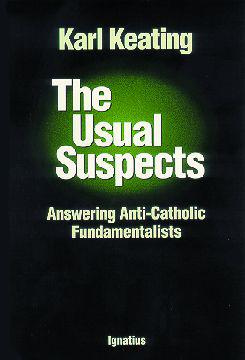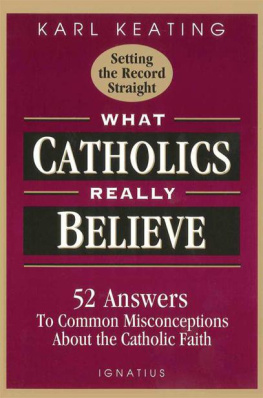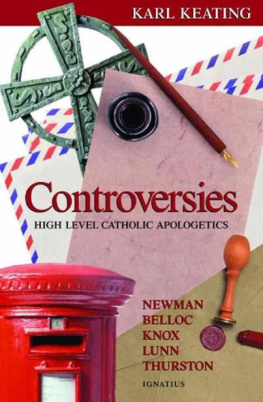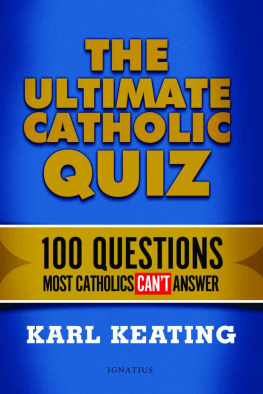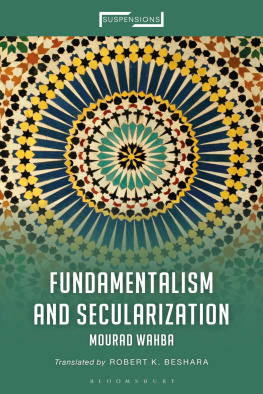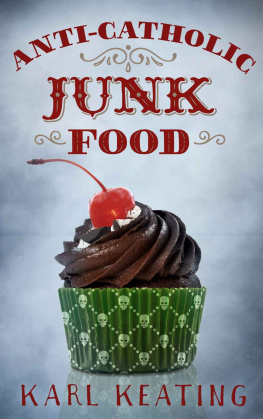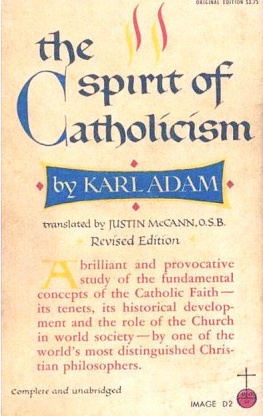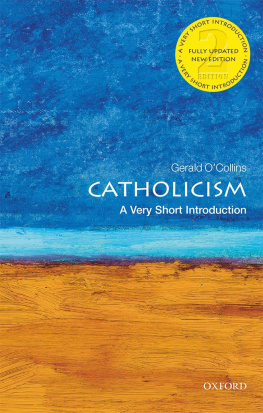Karl Keating - Catholicism and Fundamentalism
Here you can read online Karl Keating - Catholicism and Fundamentalism full text of the book (entire story) in english for free. Download pdf and epub, get meaning, cover and reviews about this ebook. year: 1988, publisher: Ignatius Press, genre: Religion. Description of the work, (preface) as well as reviews are available. Best literature library LitArk.com created for fans of good reading and offers a wide selection of genres:
Romance novel
Science fiction
Adventure
Detective
Science
History
Home and family
Prose
Art
Politics
Computer
Non-fiction
Religion
Business
Children
Humor
Choose a favorite category and find really read worthwhile books. Enjoy immersion in the world of imagination, feel the emotions of the characters or learn something new for yourself, make an fascinating discovery.
- Book:Catholicism and Fundamentalism
- Author:
- Publisher:Ignatius Press
- Genre:
- Year:1988
- Rating:4 / 5
- Favourites:Add to favourites
- Your mark:
- 80
- 1
- 2
- 3
- 4
- 5
Catholicism and Fundamentalism: summary, description and annotation
We offer to read an annotation, description, summary or preface (depends on what the author of the book "Catholicism and Fundamentalism" wrote himself). If you haven't found the necessary information about the book — write in the comments, we will try to find it.
Catholicism and Fundamentalism — read online for free the complete book (whole text) full work
Below is the text of the book, divided by pages. System saving the place of the last page read, allows you to conveniently read the book "Catholicism and Fundamentalism" online for free, without having to search again every time where you left off. Put a bookmark, and you can go to the page where you finished reading at any time.
Font size:
Interval:
Bookmark:
Catholicism and Fundamentalism
The Attack on Romanism
by Bible Christians
Karl Keating
Catholicism
and
Fundamentalism
The Attack on Romanism
by Bible Christians
IGNATIUS PRESS SAN FRANCISCO
Cover design by Marcia Ryan
1988 Ignatius Press, San Francisco
All rights reserved.
ISBN 978-0-89870-177-7 (SB)
ISBN 0-89870-195-3 (HB)
Library of Congress catalogue number 87-82939
Printed in the United States of America
Do not be afraid, speak out, and refuse to be silenced; I am with thee, and none shall come near to do thee harm; I have a great following in this city.
(Acts 18:9-10)
Few orthodox Catholics can imagine themselves leaving their religion for another. If, in the disorientation that comes between sleep and wakefulness, they imagine changing their spiritual allegiance, they see themselves waving a fond farewell to Rome (Well, it was almost what we were looking for) and walking but a short distance to something Romelike.
They may see themselves turning to Eastern Orthodoxy, perceived as a haven from modern religious travails, or to Anglo-Catholicism, still a lure for the romantic and for readers of Pusey, Keble, and the early Newman. Or they may see themselves withdrawing from the active practice of religion, remaining culturally Catholic, honoring the faith of their upbringing in the breach and the perhaps twice-yearly observance (to placate spouse and children). To convert to mainline Protestantism, or to collapse into agnosticism, does not occur to them even in nightmares, and outright atheism is for crackpots and sour old men. They can contemplate only a slight shiftthat, or a life of undistinguished lapsarianism.
What few practicing Catholics can imagine is that they might chuck Catholicism for something like fundamentalism, to which they are not drawn at all. Still, they know that people of their acquaintance, people from their own parishes, have made the transition, and are seemingly none the worse for wear. These former Catholics function the same way on the job, cavort with their children at the same parks, and shop at the same malls. They seem largely unchanged by their newfound faith.
Despite that, their conversion is taken as a betrayal because it is a denial. A change to Eastern Orthodoxy or Anglo-Catholicism is more an adjustment than a real switch; even becoming a lapsed Catholic makes sense, since it is a matter of letting spiritual indolence take control. But fundamentalism? To embrace it is to reject Catholicism outright, because fundamentalism does not just modify, but discards, the sacramental and liturgical core of Catholicism. One might as well subscribe to an obscure Eastern cult. To most Catholics, that would be just as sensible.
This lack of sympathy with the bare possibility of conversion to fundamentalism may be one reason the fundamentalist problem is misunderstood by Catholics. After all, it is hard to understand something that is not taken seriously. But the allure of fundamentalism should be taken seriously, if for no other reason than that hundreds of thousands of Catholics have taken it so seriously in the last few years that they have joined Bible-believing churches. Many of them have become not just non-Catholics, but anti-Catholics, because such an attitude is the natural result of the logic of their position. They perceive a duty to bring into real Christianity the family and friends they left at Mass, and bring them in they have. In this they have not been left to their own devices. Hundreds of organizations and thousands of individuals work to introduce Catholics to fundamentalism, and each year they distribute millions of books, tracts, and recordings. They have been remarkably successful, and their techniques and arguments are worth examining.
First, though, a few words about what not to expect. What follows will be no thorough review of fundamentalism as a whole and still less of Protestantism. The focus is on that part of fundamentalism actively engaged in anti-Catholic work and on the issues brought up in that work. Just as fundamentalists form a subset of all Protestants, so actively anti-Catholic fundamentalists are a subset of all fundamentalists. It is the tireless workers in the anti-Catholic fields who are profiled here, and even then there is room to consider only representatives of the movement and only some of their charges.
Do not expect this book to discuss what it is not meant to discuss. (There is little more frustrating for a writer than to be accused of badly handling a topic he had no intention of discussing anyway.) The focus is on those fundamentalists, whether blessed with notoriety or with anonymity, who try to convince Catholics to forsake Rome and on the arguments they make against Catholicism. Many of the best-known fundamentalists do not fall within this purview because they act irenically, making common cause with Catholics on social and political matters and never using terms such as papist, or Romish, or Jesuiticalterms that are giveaways for active anti-Catholics.
Keep in mind that when we try to locate fundamentalism on the religious spectrum, we run into all sorts of terminological confusions. What popularly goes by the name may be considered one wing of evangelicalism. In fact, the theology attributed to fundamentalists in this book can be attributed to many self-described evangelicals who are put off by fundamentalisms reaction to the Catholic Church. It is easy to find people who call themselves evangelicals, who disdain fundamentalists, who are reasonably friendly with Catholics (even allowing us the title Christian), yet whose theological beliefs are indistinguishable from those of strict fundamentalists. Millions who shun the label are theologically fundamentalists.
For convenienceor out of discomfort in being bracketed with people who get a bad pressthey choose a looser label. And loose it is. Evangelicalism is a spectrum. At one end it merges, even coincides, with strict fundamentalism; at the other it fades into mainline Protestantism, which is to say, religious liberalism. It is a matter of convenience that the term fundamentalist is used in these pages. There appears to be no adequate alternative. Evangelical is too broad; conservative evangelical is too awkward; Bible Christian implies that no other Christians base their faith on the Bible.
In covering anti-Catholic activity among fundamentalists, a writer cannot please everyone, Catholic or fundamentalist. Sometimes he cannot please anyone. Each reader will lament that something was left out, something was given too much attention, or something was given the wrong emphasis. Why did he skip the one important point? people will ask. Why is this group omitted?
The United States boasts (if that is the proper word) hundreds of anti-Catholic organizations. Only a few can be profiled here. Little-known organizations headed by little-known anti-Catholics have been given as much space as their well-known counterparts because most anti-Catholic groups are small, though their cumulative effect is large. Even then, it is not so much the groups that are examined as their arguments. The selection of arguments has not been entirely arbitrary, although it may appear so to the reader unable to find a consideration of the one that most interests him. Opponents of Romanism throw countless accusations against the Church. There is hardly space to list them all, let alone space to refute them. Far better, surely, to look at a sampling, stating the anti-Catholics positions, so far as possible, in their own words and leaving room for what are intended to be adequate, although not complete, Catholic rejoinders.
The first part of this book deals with professional anti-Catholics, fundamentalists who earn their livelihoods by attacking the Whore of Babylon. In the second part representative issues are dissected. The final chapters give advice in practical apologetics (what to do, what not to do) and in the intellectual preparation necessary for fruitful apologetics work.
Next pageFont size:
Interval:
Bookmark:
Similar books «Catholicism and Fundamentalism»
Look at similar books to Catholicism and Fundamentalism. We have selected literature similar in name and meaning in the hope of providing readers with more options to find new, interesting, not yet read works.
Discussion, reviews of the book Catholicism and Fundamentalism and just readers' own opinions. Leave your comments, write what you think about the work, its meaning or the main characters. Specify what exactly you liked and what you didn't like, and why you think so.


